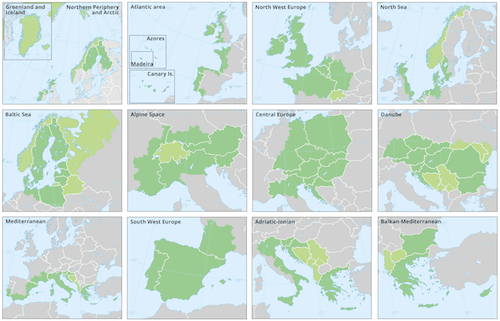
Cooperation is key to improve climate change adaptation in sensitive European border regions, maritime areas

Europe’s border regions and maritime areas like its Arctic and Mediterranean regions are facing more negative impacts due to climate change, but countries responsible for these transnational areas are already taking action to adapt to changes like heat waves, or heavy rainfalls, according to an ETC/CCA Technical Paper.
The Technical Paper “Adaptation policies and knowledge base in transnational regions in Europe“ published on 8th December 2018 by the European Topic Centre on Climate Change Impacts, Vulnerability and Adaptation (ETC/CCA) provides an up-to-date state of play on how European countries are working together in adapting to climate change impacts in these shared regions, some of which are considered climate change hot spots – most vulnerable to dramatic changes.
The information collection and analysis was carried out in 2018, under Framework Partnership Agreement with the European Environment Agency (EEA), and a summary overview of the main findings are presented in a EEA briefing released today “Addressing climate change adaptation in transnational regions in Europe”.
The Technical Paper focuses on 12 of the 15 European transnational regions including the North Sea, North West Europe, Northern Periphery and Arctic, the Baltic Sea, the Danube, the Atlantic Area, the Alpine Space, Central Europe, the Adriatic-Ionian, the Balkan-Mediterranean, South West Europe and the Mediterranean. These regions straddle numerous EEA member countries where environmental issues are being tackled between the countries via various regional and European Union cooperation initiatives, including the so-called Interreg V B programme. Climate change adds to existing environmental problems faced by these regions, like increased population shifts, air and water pollution and changing land use patterns which make them more vulnerable.
The paper notes that some of these regions already have longstanding international conventions that, by setting out rules on how to cooperate on many cross-border issues, have strengthened efforts in climate change adaptation and have established cooperation agreements with EU macro-regional strategies. Common transnational climate change adaptation strategies and plans complement these conventions, which in many cases already include efforts to protect and improve local ecosystems or to better manage water supply. However, the level of implementation varies.
Building, sharing knowledge key to improving cooperation
Regional adaptation-related projects have focused on improving knowledge, including awareness raising, capacity building and creating networks to exchange information. But this knowledge is not always well exploited, the briefing says. Web-based adaptation platforms, knowledge centres and networks are also active in most of these transnational regions.
The European Climate Adaptation Platform (Climate-ADAPT) has a section devoted to “Transnational regions and other regions and countries” that provides an overview of the available information about climate change adaptaption policy frameworks and initiatives, including those related to knowledge creation and sharing, in these transnational regions.
The ETC/CCA Technical Paper complements recent reports on climate change adaptation recently published by the EEA, with ETC/CCA support, including: “Climate change, impacts and vulnerability in Europe 2016“ and “Climate change adaptation and disaster risk reduction in Europe — enhancing coherence of the knowledge base, policies and practices“ which highlight the urgency to tackle the impacts of extreme weather- and climate-related events and the emerging innovative tools national, regional and local authorities are already using for this purpose.
The CMCC Foundation contributed substantially to the work.
CMCC researcher Margaretha Breil (ECIP) is one of the three lead authors of the ETC/CCA Technical Paper and worked in particular to the analysis of the cooperation programmes and initiatives on climate change adaptation in the transnational regions (Chapters 1 and 3).
CMCC researcher Elisa Calliari (RAAS) is one of the contributing authors of the paper and dealt in particular with the topic of Outermost Regions in the European Union (Annex 1), an integral part of the EU particularly vulnerable to climate change impacts, especially from sea level rise and extreme weather and climate events.
The document preparation has been coordinated by Sergio Castellari (EEA), Margaretha Breil (CMCC Foundation), and Emiliano Ramieri (Thetis).
The ETC/CCA is a consortium of 14 European institutions contracted by the EEA and coordinated by the CMCC Foundation, the current coordinator being the researcher Silvia Medri (CSP – Climate Simulation and Prediction Division).
Download the full ETC/CCA Technical Paper.
Read the EEA Briefing.

